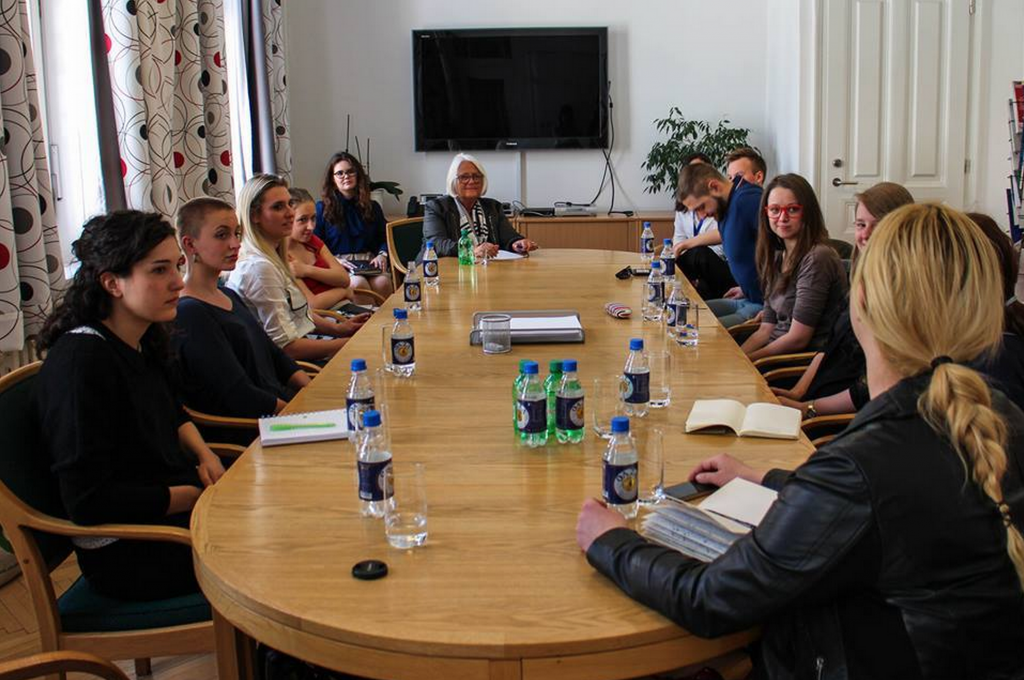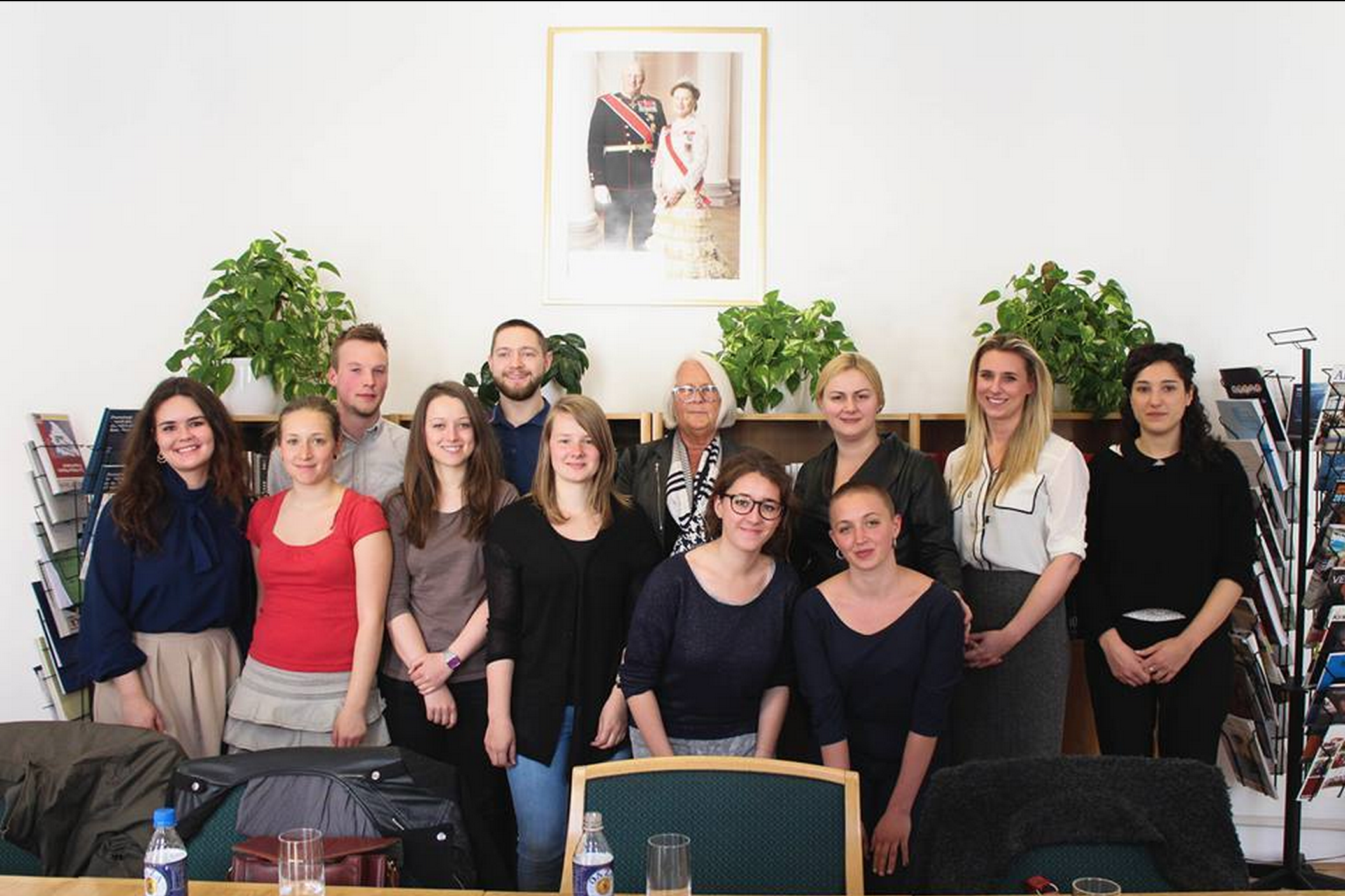
On March 22nd 2015, the Post-Conflict Research Center (PCRC) had the honor of meeting with Ms. Vibeke Lilloe, Ambassador of the Kingdom of Norway in Sarajevo. The ensuing discussion explored the Embassy’s efforts to support peace and reconciliation processes and strengthen civil society organizations in Bosnia-Herzegovina, with a specific focus on their work concerning women, victims of sexual violence and youth. Marion Pineau and Chloé Gaillard report.
“Norway, in addition to the Embassy here, is a staunch supporter of gender equality and women’s issues,” begins Ms. Lilloe. “It’s necessary to invest in the empowerment of women first and foremost from a human rights angle. It’s the right of every woman to be treated as equal to men.”
“Women are also key actors for economic prosperity in all countries,” she adds. “If you look around you, the most affluent and prosperous countries are modern democracies that are utilizing their whole work force, not just half […]. It makes perfect economic sense to empower women.”
The Ambassador cites her own country as a case in point, stating: “Many think that Norway is a rich and prosperous country primarily as a result of the oil and gas we have discovered along our coast, but this is not true. An equally important contributing factor is the high degree of gender equality and inclusion within the workforce.”
This belief in the fundamental connection between human rights, gender empowerment, and economic development underlies much of the Embassy’s current work in Bosnia, where, in addition to simply attaining prosperity, the development of a healthy economy is deemed essential to processes of peace-building, reconciliation and the realization of a stable and sustainable society.
However, as is the case in many post-war societies, Bosnia performs poorly when it comes to gender equality. Traditional and patriarchal norms and values, compounded by a legacy of war, inhibit women from taking an active role within public, social and economic processes. Gender equality and women’s empowerment are not prioritized in dominant political agendas related to public processes in Bosnia. They are marginalized with regard to holding high-level positions involved in decision-making processes, and, as a result, are limited to lower-ranking jobs within the labor market.
Within such an environment, gender inequality, combined with other social exclusions, can create severe vulnerabilities. In Bosnia, this primarily relates to the challenges that victims of wartime and other forms of sexual violence must face. Twenty years after the war, sexual violence is still a societal taboo and victims are continue to suffer from high levels of stigmatization. In addition, the majority of those who suffered sexual violence during the war are yet to receive any form of justice or compensation.
According to Ms. Lilloe, “the best way to help such women [is] to reintegrate them back into society. The best way of doing this is to secure paid work for them, as holding paid positions gives these women a new sense of self-respect and a feeling that they matter within their society.”
The Embassy’s support of the Association Udruzene exemplifies the merits of this approach. The association aims to use knitting as a way to confront war traumas and to reintegrate women into society through economic and psychosocial empowerment. Medica Zenica is also involved in the project, providing psychosocial and medical support. The Ambassador explains that, for some women, “the knitting sessions [are] the only kind of therapy they have ever received.” Through the work of the association, they finally feel acknowledged, which enables them to regain a sense of dignity.
The Ambassador plans for the Embassy to continue this work for the foreseeable future, assisting not only with victims of wartime sexual violence, but also with women in any difficult situation. The Norwegian and Swedish Embassies are currently co-funding a collaborative project between the DCAF Centre for Security, Development and Rule of Law and Atlantic Initiative, with the aim of improving the standards of treatment that victims of domestic violence receive in the Bosnian judicial system.
Ms. Lilloe also emphasizes the crucial role that young people must play in these peace-building and development processes, citing the danger the country is facing as a result of the current exodus of youth. “Many well-educated young people are leaving the country to seek greener pastures,” she explains. “[The] people are this country’s best asset,” adding that “[young people] are the future.”
The Ambassador elucidates that giving youth a proper education and the space to express their views, concerns and ideas are crucial to involving them in processes of reconciliation, achieving sustainable peace, and persuading other young people to stay. Above all “they deserve a bright future at home,” she concludes.

PCRC is grateful to the Norwegian Embassy for their support of our project “Ordinary Heroes,” and would like to thank Ambassador Lilloe and her staff for their time and warm welcome.






